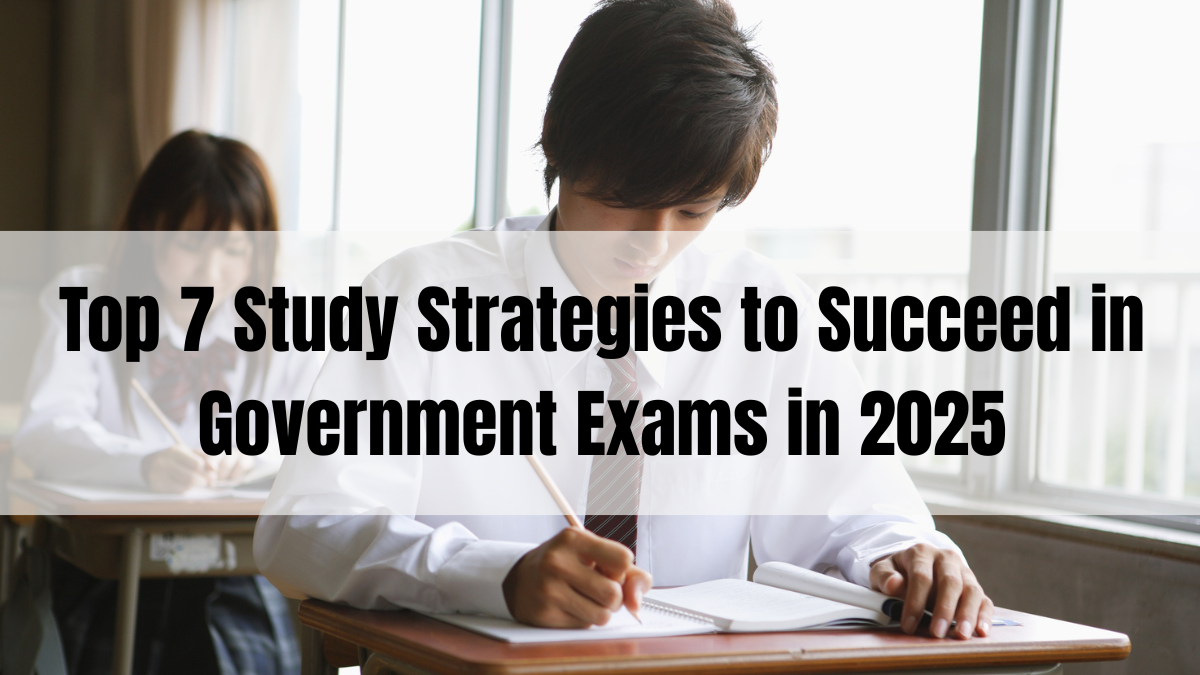Cracking a government exam in India is not just about knowledge—it’s about planning, mindset, consistency, and execution. Whether you’re aiming for SSC, UPSC, Banking, or Railways, your approach defines your outcome. In 2025, the competition is more intense than ever, and only those with the right study strategies will rise above the rest.
In this article, we’ll break down the top 7 proven strategies that have helped thousands of aspirants achieve success in govt exams. From creating smart timetables to mastering revision, each point is designed to boost your preparation the smart way.

1. Choose Your Exam and Know the Syllabus Deeply
Success begins with clarity. Before you even pick up a book, decide which exam you’re targeting. Is it SSC CGL, UPSC Prelims, IBPS PO, or a state-level PCS exam? Each exam has different requirements, so understanding the syllabus is the foundation of your preparation.
-
Visit the official website and download the syllabus PDF.
-
Compare it with previous years’ papers to identify focus areas.
-
Make a checklist of all subjects and sub-topics.
This will help you avoid wasting time on unnecessary topics and focus only on what matters.
2. Create a Smart and Realistic Study Plan
Every topper swears by a consistent study schedule. To ensure success in govt exams, you must study every day—but not without a plan. Don’t make the mistake of preparing without timelines or targets.
Here’s what a smart study plan includes:
-
Dedicated hours for each subject (rotate between strong and weak areas)
-
Daily current affairs updates
-
Weekly revision and test schedule
-
Time for mock tests and previous year paper practice
Pro Tip: Study tougher subjects like Quantitative Aptitude or Polity in the morning when your focus is highest.
Sample Weekly Study Plan
| Day | Focus Areas | Time Allocation |
|---|---|---|
| Monday | Quant + Current Affairs | 3 hours |
| Tuesday | Reasoning + History | 3 hours |
| Wednesday | English + Polity | 3 hours |
| Thursday | Mock Test + Analysis | 2 hours |
| Friday | Revision (Mon-Wed topics) | 2 hours |
| Saturday | Science + Current Affairs | 3 hours |
| Sunday | Full Mock Test + Weekly Review | 3 hours |
3. Use NCERTs and Standard Books Effectively
The right books make all the difference. Don’t hoard material—instead, select 1–2 best books for each subject and revise them thoroughly.
Examples:
-
History – NCERT + Spectrum Modern History
-
Polity – Laxmikanth
-
Economy – NCERT + Ramesh Singh
-
Quant & Reasoning – RS Aggarwal, Arun Sharma
-
Current Affairs – Daily newspaper + Monthly magazine (Vision, Drishti, etc.)
Revising one book three times is far more effective than reading three books once.
4. Practice with Previous Year Papers and Mocks
One of the strongest indicators of success in govt exams is mock test performance. Practicing previous years’ papers:
-
Helps you understand question patterns
-
Improves time management
-
Reduces exam fear
Take at least 2–3 full-length mock tests weekly and analyze them thoroughly. Identify where you’re making mistakes and work on those weak areas.
5. Strengthen General Awareness and Current Affairs
A major portion of most government exams includes General Knowledge and Current Affairs. This section is scoring—but only with regular updates.
Your daily current affairs routine should include:
-
Reading one reliable newspaper (The Hindu or Indian Express)
-
Watching short daily current affairs videos
-
Revising from monthly PDFs (Vision IAS, AffairsCloud, etc.)
Make short notes topic-wise (polity, economy, international, etc.) and revise weekly.
6. Revise Regularly and Use Active Recall Techniques
Don’t just keep moving forward. Without revision, information fades. Use techniques like:
-
Spaced repetition
-
Flashcards
-
Mind maps
Reserve at least 1–2 hours every week for revision, especially for subjects like history, polity, and science.
Active recall (asking yourself questions instead of rereading) helps reinforce memory better than passive reading.
7. Take Care of Your Health and Stay Mentally Fit
To truly achieve success in govt exams, physical and mental health are equally important.
-
Sleep 7–8 hours to improve memory and focus
-
Take 5–10 min breaks between sessions
-
Meditate or do light exercise to manage stress
-
Avoid social media distractions during study time
A healthy body supports a sharp brain—don’t ignore this part of your preparation journey.
FAQs
What is the best daily routine for government exam preparation?
Start your day early, study high-focus subjects in the morning, keep evenings for revision and light subjects, and always include short breaks between sessions.
How many hours should I study daily to succeed in govt exams?
It varies per individual, but ideally 6–8 focused hours with proper breaks and a weekly plan ensures better retention and balance.
Can I clear a government exam in the first attempt?
Yes, many toppers do. With the right study plan, consistent practice, and focused revision, success in govt exams is absolutely achievable in your first attempt.
How important is current affairs in competitive exams?
Extremely important. It carries a major portion in exams like UPSC, SSC, and Banking. Reading daily news and revising monthly compilations is crucial.
Should I join a coaching institute or prepare at home?
It depends on your discipline and understanding. Self-study works for many, but coaching helps in guidance and test series. Use free online resources wisely if preparing at home.
Click here to know more.




